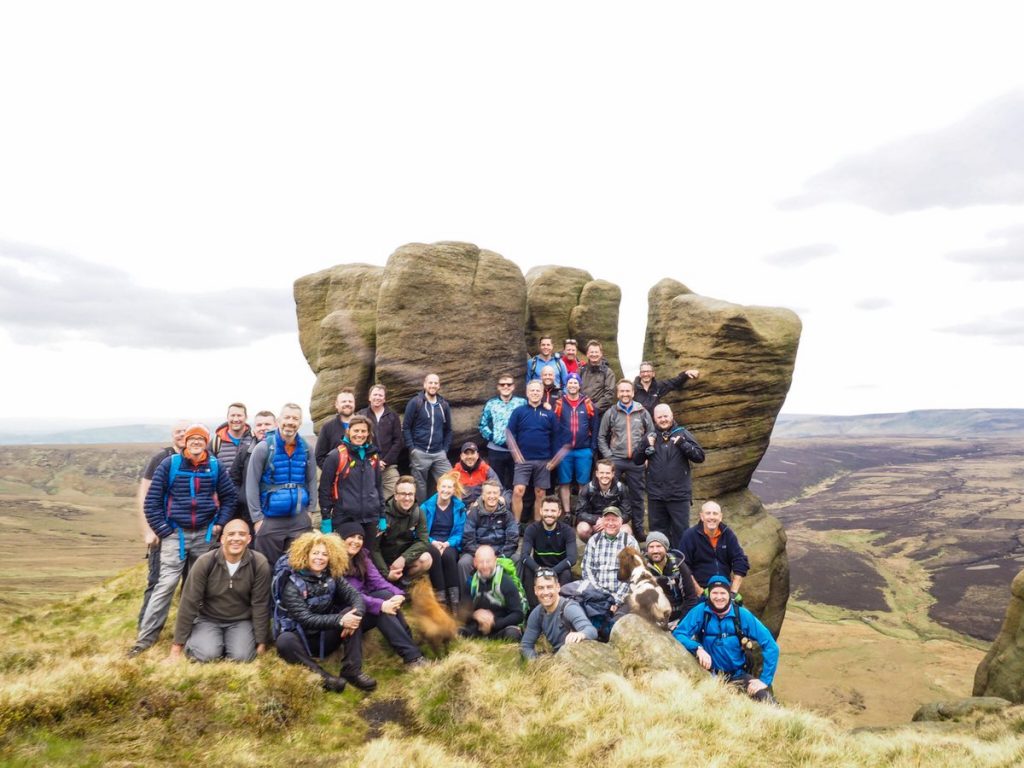I’m a rambler from Manchester way
I get all me pleasure the hard moorland way
I may be a wage slave on Monday
But I am a free man on Sunday
~ Ewan MacColl (from ‘The Manchester Rambler’)
On a glorious spring morning last Friday, under a radiance of blue skies, a buoyant group of northern business folk walked into history. They did so by spending the day hiking a historic route to commemorate a celebrated chapter in England’s revolutionary past.
In 1932 a group of young workers walked the hills of the Peak District between Manchester and Sheffield in defiance of the local landowners and the stick-wielding gamekeepers they employed to nurture their grouse. In doing so, the Kinder Scout mass trespass, as it became known, marked a milestone in the struggle for the right to roam, helping secure freedoms that we enjoy to this day as we ramble through the countryside working up an appetite for Sunday lunch.
Here in the present day this group’s descendants were committing their own small revolutionary act by joining one of Manchester’s ‘Freshwalks’, a growing network of like-minded business people who recognise that escaping the office regularly for a day together isn’t escapism but a valuable chance to connect and refresh. They’ve learnt that the day away pays for itself by sparking the new ideas, fresh perspectives and ‘big picture’ state of mind they need to achieve good things the rest of the time.
It’s a sound investment in personal productivity and wellbeing but, talking to people as the walk unfolded, it became apparent that some less welcome strategies were being employed to pay for the time away.
One fellow rambler had worked some extra evenings before the walk, consciously getting ahead so he could relax and spend a guilt-free Friday up in the hills. Others had instead chosen to buy the day on credit by enjoying their freedom up front but knowing that a goodly chunk of the subsequent bank holiday weekend was going to be spent on payback, catching up on backlog.
Both tactics were deployed with the same worthwhile end in mind; the flicking of an ‘off’ switch for the day to fully savour the convivial company and the spectacular views. Therefore, since ‘off’ is a mental state that the Getting Things Done methodology seeks to bring about on a much more regular basis, some of its practices should be useful here.
Getting one’s house in order ahead of time off is much easier if you’ve completely captured and clarified everything that needs your attention. It gives a complete inventory of commitments in your GTD lists that you can then easily scan to pinpoint things that will be affected by a day away. You then have the option to either get them done, hand them off to someone else or let someone know they’ll have to wait a little longer. Clarity for all concerned.
Knowing that you’ve done this thoroughly will mean you can then switch off for the day without being bugged with thoughts like, ‘Um, did I remember to…?’ and ‘Oh drat! I forget to…’ (These thoughts will be much more frustrating out in the sticks, too, because you have no signal and can’t do anything about them.) As David Allen says, “You can only feel good about what you’re not doing, when you know what you’re not doing.”
The same GTD lists will help again when it’s time to get back to work, too, because they’re an immediate snapshot of exactly how things were when you left them so you’ll be able to hit the ground running. (Probably only metaphorical running, though, if you’ve just done an 18 mile walk. I was as likely to run the next day as I was to fly).
Back in the office you’ll also be confronted by a day’s worth of new stuff in your inbox. At this point your new zen-like glow of wellness may start to evaporate like morning mist in the mountains, but a smoother re-entry into your working rhythms will be possible if you’re using GTD’s ‘next action’ decision-making and clarifying email backlog quickly, calmly and cleanly.
Benefitting from practices like these around one-off events is helpful, of course, but managing workflow like this all the time using the five phases of the GTD methodology means you can flick the ‘off’ switch at the end of every day, and we need that more than ever.
We no longer have to battle gamekeepers to access our open spaces, but the world comes at us so fast these days that we have to fight just as hard for our headspace instead.
Photo: Katya Willems


